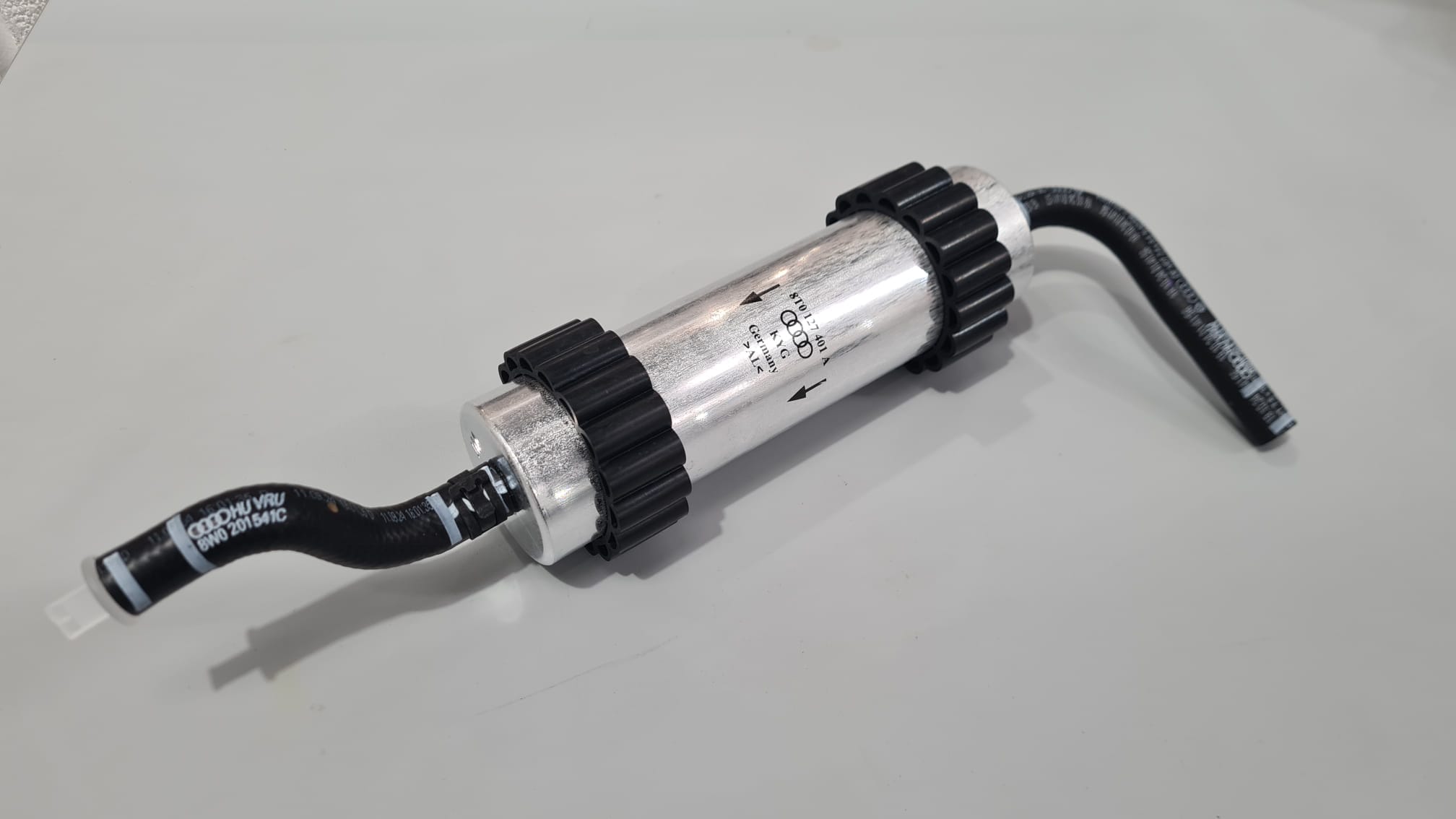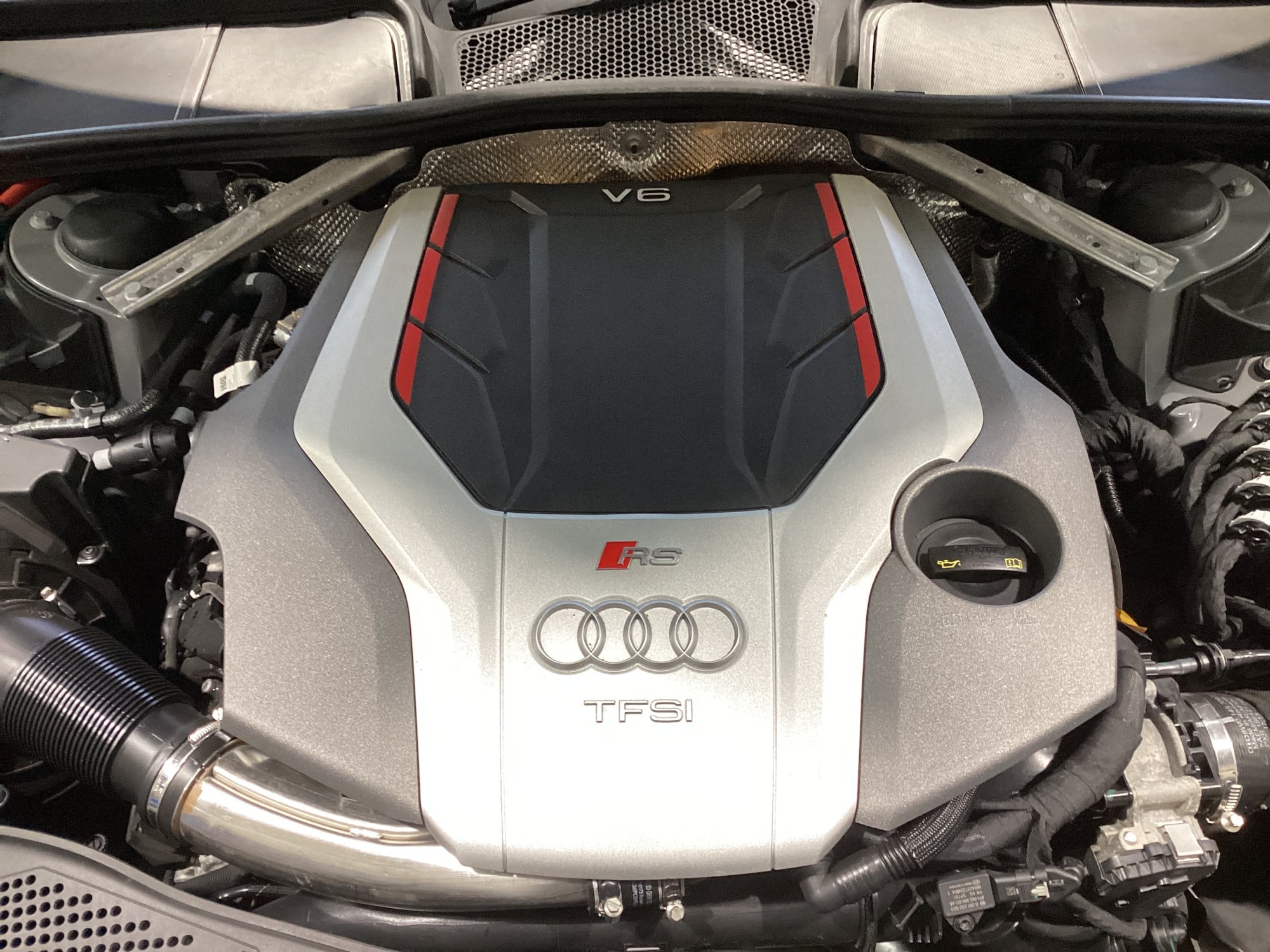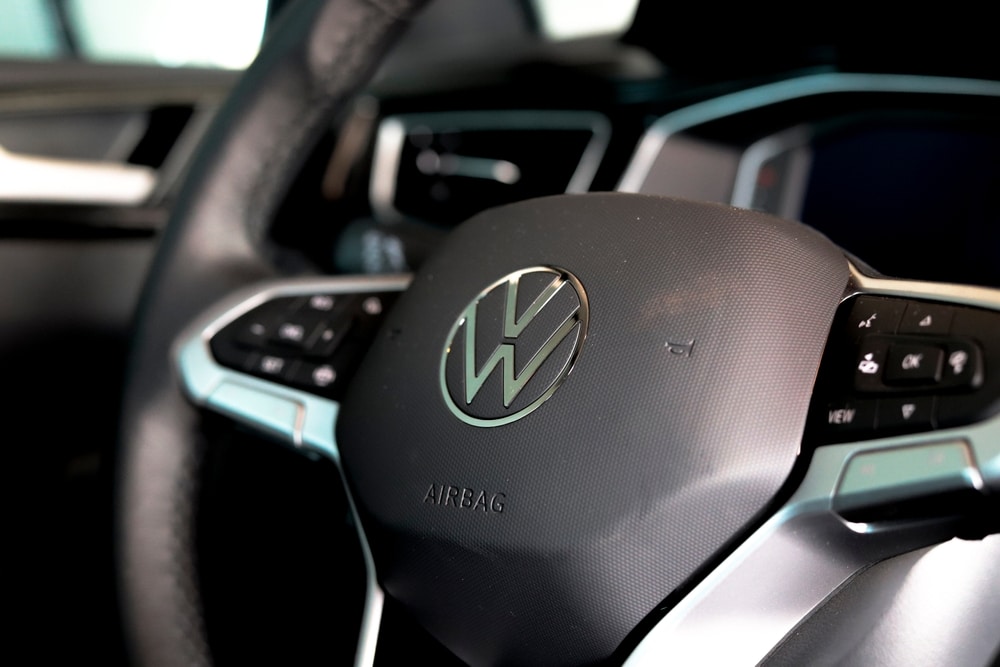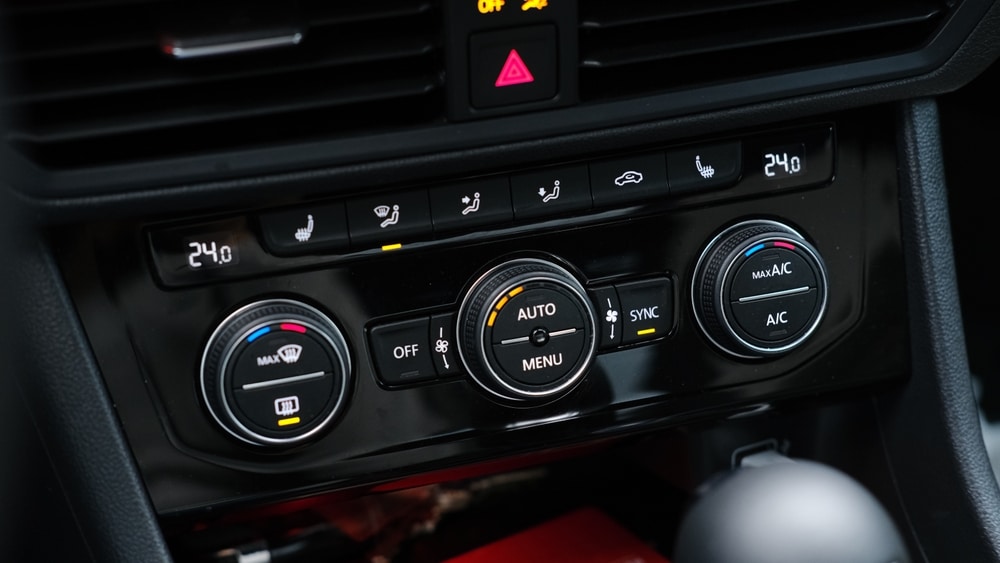Diesel Fuel Filter
Could overlooking a part as small as your diesel fuel filter really cause major issues? The answer is yes.
Your diesel fuel filter protects the critical parts of your vehicle’s fuel system from dirt and water. If you skip servicing, problems can escalate quickly, from rough running to costly repairs… Sometimes costing thousands of pounds.
This article takes you through your diesel fuel filter’s location, its function, the types used, and what happens if it’s ignored.
More importantly, you’ll see why timely replacement is one of the most effective steps you can take to protect your diesel engine and your finances.
Not sure when your filter was last checked? Book your service with Fitch Autos, Brownhills today.
Call 01543 452630 and let our team keep your vehicle in top shape.
Diesel fuel filter location explained
Your vehicle’s diesel fuel filter, highlighted as part 4 in the diagram, is fitted within the low-pressure circuit between the fuel tank and the high-pressure pump.
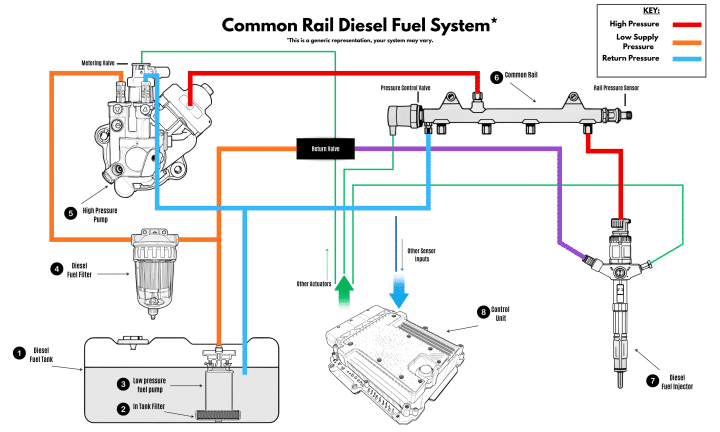
On most modern models, your vehicle’s diesel fuel filter can often be found in the engine bay to allow easier access during servicing.
Some diesel fuel systems also include an in-tank pre-filter, labelled part 2 in the diagram. This mesh strainer helps block larger debris from entering the low-pressure fuel pump.
Diesel fuel filter functions explained
Your car’s diesel fuel filter is designed to protect the key elements of the fuel system. It does this in these core ways:
- Separating water: Diesel naturally contains small amounts of water. The filter removes this moisture before entering further up the diesel fuel system, preventing corrosion in the high-pressure pump and injectors and avoiding expensive damage.
- Filtering particles: The diesel fuel filter traps fine impurities and debris suspended in the fuel before reaching the high-pressure pump or injectors. Without this protection, contamination can cause wear, blockages, or even costly failures.
Your diesel fuel filter is the primary safeguard against the contaminants that could otherwise cause serious repair bills.
Regular replacement is a vital part of preventative care; book your diesel service with Fitch Autos, Brownhills today. Call 01543 452630 to arrange your appointment.
How diesel fuel filters are built
All modern diesel engines rely on a fine filter module (labelled part 4 in the diagram) to protect against contamination. The construction can differ:
- Cartridge style: This is the most common design today. A fixed plastic or aluminium housing remains in the engine bay, holding a pleated, multi-layer element. The element itself removes particles and separates water, while the housing may also contain features such as valves, sensors, or a hand primer. During servicing, only the internal filter element is changed.
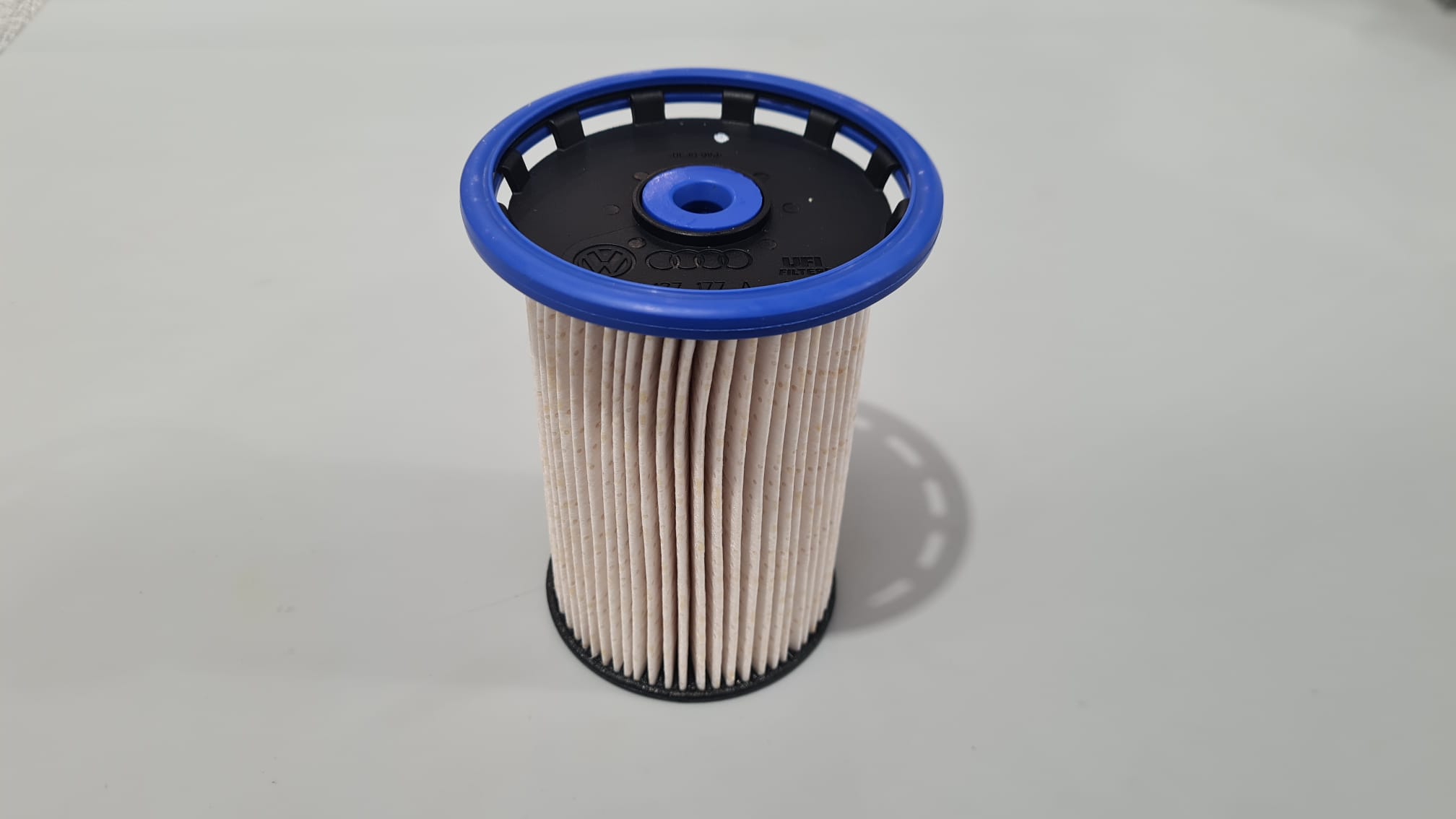
- Complete canister type: In this setup, the filter is a sealed unit that’s replaced as a whole, housing and media together. This design is more often found in older vehicles or heavy-duty diesel systems. Some versions also incorporate extra functions such as water separation layers or built-in drain bowls.
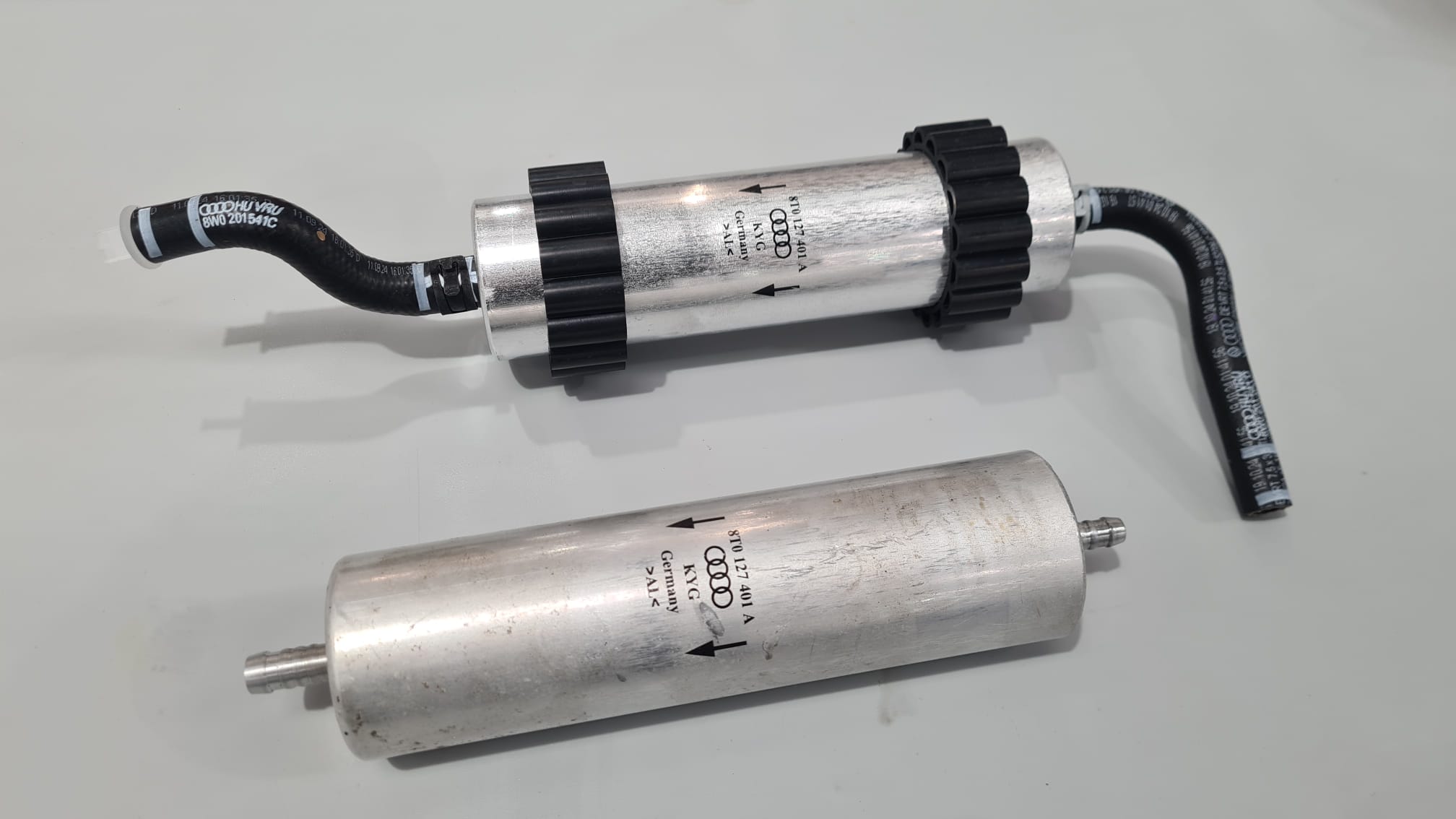
Most modern systems also feature an additional pre-filter in the tank (part 2 in the diagram). This helps catch larger debris before it ever reaches the main filter.
Staying on top of filter replacement is an easy way to protect your diesel engine from costly issues.
Common diesel fuel filter faults explained
A diesel fuel filter that isn’t working properly can cause multiple issues:
- Strainer blockage: The pump works harder and becomes noisy, with fuel delivery becoming inconsistent.
- Filter restriction: A clogged element reduces flow, leading to poor running or starting failure.
- Air leaks: Incorrect installation or seal damage lets air into the fuel line, creating hesitation or long cranking.
- Water in the system: If not separated, water can corrode the high-pressure fuel pump and injectors.
- Wrong fitment: Using the incorrect filter or poor sealing may cause air ingress, fuel leaks or unfiltered diesel bypassing it.
Getting your filter checked by professionals ensures these problems are resolved before lasting damage occurs.
If your diesel vehicle has a problem, it’s worth checking. Call Fitch Autos, Brownhills, for expert advice.
Diesel fuel filter service and life expectancy
A diesel fuel filter doesn’t have a universal replacement interval. The correct timing depends on your vehicle’s recommended interval guidance (you can usually find this in your vehicle’s handbook).
However, it’s worth keeping these points in mind:
- Priming is essential: After a filter change, your vehicle’s diesel fuel system must be primed appropriately using the vehicle’s pumps or an integrated hand primer. If this step is skipped, air can remain trapped in the fuel line, leading to hard starting or even damage to the high-pressure pump.
- Correct filter type and quality: Always fit the diesel fuel filter design specified for your vehicle, whether cartridge or sealed. Not all filters are manufactured to the same standard. Poor-quality parts may cause leaks, fuel restriction, or weak water separation – problems that can quickly put the system at risk.
- Declining efficiency over time: ISO testing shows that a new diesel fuel filter can remove more than 95% of water. By the end of its service life, that efficiency can drop to around 70%, leaving the system much less protected.
- Water checks: Some diesel fuel filters have a drain or a water-in-fuel sensor. If fitted, these should be checked at each service, and any collected water drained off as required. Ignoring this step can allow moisture to build up and harm the injectors or pump.
Following the replacement schedule is a key part of preventative maintenance, protecting both performance and reliability.
Don’t be tempted to skip your servicing to save money; it could leave you with larger repair bills later on, which is the last thing anybody wants.
Safeguarding your diesel fuel system
Replacing your diesel fuel filter on time is one of the easiest ways to protect the wider system. It ensures dirt and water don’t cause damage to your diesel fuel system, which leads to high repair costs.
Keeping to the manufacturer’s service schedule minimises the risk of breakdowns and maintains smooth performance. Looking after this small part now helps avoid major problems later, potentially saving you money in the long run.
To keep your vehicle in safe hands, you’ll want a trusted garage. That’s precisely what you’ll find at Fitch Autos in Brownhills.
Why drivers choose Fitch Autos, Brownhills
Our team of experts have earned the trust of drivers in Brownhills and beyond by offering:
- Courtesy cars are available for your convenience.
- Professional diesel servicing from a long-standing local garage.
- A 12-month parts and labour guarantee.
Our garage is backed by a {{average-rating}}⭐ Google rating from {{review-count}} happy drivers in Brownhills, giving you added confidence when you book your diesel vehicle service with us.
Are you unsure when your diesel filter was last changed? Book your service with Fitch Autos, Brownhills, today.
Call 01543 452630, and let our team keep your vehicle running smoothly.
Diesel fuel filter FAQ
What does a diesel fuel filter do?
A diesel fuel filter removes tiny particles and traces of water before they can reach vital components such as the high-pressure fuel pump and injectors. Without it, contamination can cause wear, blockages, or corrosion, which in turn may lead to poor performance or costly fuel system failures.
Where is the diesel fuel filter located?
In most vehicles, the main diesel fuel filter sits in the low-pressure part of the system between the fuel tank and the high-pressure pump. On many modern cars, it’s installed in the engine bay for easier access during servicing. In addition, most systems also have a coarse strainer inside the tank to capture larger debris before it reaches the filter.
What are the symptoms of a blocked diesel fuel filter?
When a diesel filter becomes clogged, you may notice hard starting, hesitation when accelerating, a loss of power, stalling, or, in some cases, a complete no-start condition. These symptoms can overlap with other mechanical problems, so it’s essential to have the vehicle checked by a qualified technician.
Can a clogged diesel fuel filter damage the pump?
Yes. A blocked filter restricts fuel flow, which forces the high-pressure pump to work harder. Over time, this strain can cause premature wear or even pump failure, a repair that is far more expensive than replacing the filter at the correct interval.
How often should a diesel fuel filter be replaced?
There isn’t a universal mileage or timeframe for replacement, as each manufacturer sets their own service schedule. The best approach is to follow the official guidance for your vehicle and have the filter changed at the intervals they recommend.
